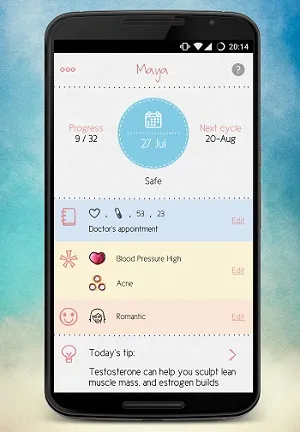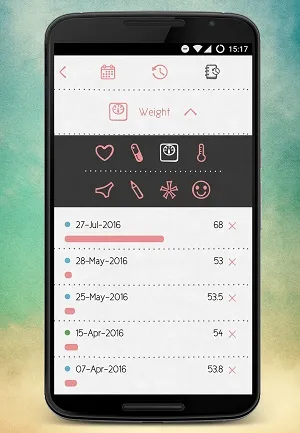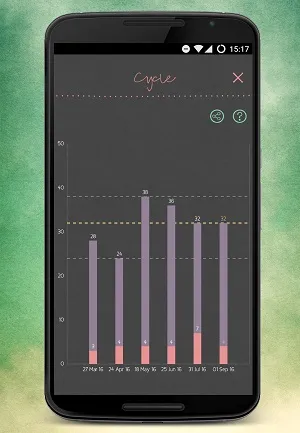[App Fridays] How Prime Venture Partners-backed Maya aims to become an all-round health assistant for women
“Information is the oil of the 21st century, and data analytics is the combustion engine”
Recent advances in technology has made it possible for scientists and even laymen to gather large volumes of data, analyse and gain insights from them. The ‘quantified self-movement’, which aims to incorporate technology into data acquisition of the different aspects of a person's daily life, has been at the forefront of this movement.
There are now apps that help users track their online activity and set personal restrictions; others which monitor health and nutrition and step counters. Maya, an app developed by Plackal Tech, tracks menstrual health and has so far achieved over 6.5 million installs worldwide.

What is Maya?
In its essence, Maya is a period (menstrual cycle calendar) tracker app that helps women track their cycles, related symptoms, mood swings and overall health. Users can leverage Maya for three main use cases- tracking health, improving odds of conception or avoiding pregnancy.
For all three use cases, users need to constantly track their mood, physical symptoms and also note other details like weight, basal body temperature (BBT), extent of blood flow and other details. The collated data is then fed to Maya’s prediction algorithm, which helps the user make sense of it by providing timely tips and also by keeping track of the current cycle. John Paul, Founder of Plackal Tech, noted:
People often joke about PMS, but it can be quite acute for some women. Actively tracking cycles can help women be better prepared. For Maya, the data inputs by the users are key as the more accurate and richer the data set, the more accurate the suggestions and predictions will be.
Features

-Offline integration: Apart from the initial sign up process, Maya doesn’t require users to be connected to the internet. The app automatically backs up the data to the account when internet is available and also syncs it across multiple devices, which the user has logged into.
-Intuitive colour codes for different menstrual phases; automatic and accurate prediction of fertility.
-View statistics and history graphs for weight and temperature fluctuations.
-Ability to tweak menstrual cycle length and flow length.
Story so far
Plackal Tech, the parent company behind Maya, was founded in 2011 by John, an alumnus of Indian Institute of Management, Bangalore (IIMB), and Christ College, Bangalore. Prior to founding Maya, John held various positions with the R&D division of Think3 developing Computer Aided Design Software.
John’s passion for mobile consumer tech lead him to start Plackal. It initially started out as a services company and then the team started working on products simultaneously. At an event in Bengaluru, when John introduced himself and his venture to a VC, he was advised to focus on either one and not both (products and services) if he was thinking long term for Plackal. While the services front was what was generating Plackal constant revenue, John realised that they had to focus more on the product and decided to shut down their services vertical.

Since the launch of Maya (then called Love Cycles) in 2012, it has clocked 6.5 million downloads worldwide across Android and iOS platforms. The startup currently consists of a team of 16 members across technology, marketing and other roles. Raghu Mallena, an IIT Madras and University of Wisconsin, Madison, alumnus, has worked at companies like Netapp, Cisco and Juniper spanning multiple geographies (US, India, China and Israel) and is currently the CTO at Plackal. Monica Rastogi, another key member of the team, leads the mobile engineering division. She had earlier co-founded food-tech venture Dazo and has been working on Android since 2009.
In 2014, Plackal was selected among YourStory's Tech 30 companies at TechSparks. Earlier this year, Plackal Tech raised Rs 5 crore from Prime Venture Partners and also rebranded from Love Cycles to Maya. John noted that the rebranding was done for multiple reasons. They saw that some users assumed Love cycles was a dating app, while in fact the team had intended the name to denote ‘Love your cycles’. John noted that the rebranding was a tough exercise, but it turned out well in the end.
Plackal’s long term goal is to be an all-round health assistant for women. Hence, rebranding to a monosyllabic ‘Maya’, which means magic or illusion and is also a female name, made sense for the team.
Revenue model and marketing
John noted that the current focus for Maya is to gain more traction abroad and also make in-roads into the Indian market. John said,
Based on our experience so far, we know what revenue triggers work and will be focussing more on them.

While Maya is free to download and use, it includes premium themes, features and graphs that can be unlocked through in-app purchases. While in-app ads currently contribute to revenue, going forward John foresees other revenue channels like:
Product discovery: Based on a user’s progress in their menstrual cycle, Maya will be able to recommend relevant products and services related to women’s health and hygiene
Lead generation: Once Maya has a critical mass of data from users, it could observe patterns, match symptoms and recommend pro-active steps to women and recommend relevant doctors or suggest precautionary measures.
As a global product, Maya’s top three markets currently include Brazil, Mexico and Italy, with good presence in other markets like Russia, Korea and USA. John noted that the word ‘Maya’ could be transliterated into multiple languages with ease. The startup claims to have mainly relied on organic channels to attain growth, with minimal marketing spends.
Sector overview
Menstrual health is often associated with taboos and traditions in India, which often cause confusion. Platforms like Menstrupedia have been trying to break myths and educate people about the best practices of menstrual hygiene.
On the global front, platforms that operate in the same space as Maya include Glow, which is a portfolio company of Founders Fund, Andreessen Horowitz and Formation8; Mosaic Ventures-backed Clue; and Boston Seed Capital backed Kindara.
Future plans and YourStory take
While Maya is currently app-only, John noted that he and his team are considering a web version in the future to help users discover curated and in-house content that would be relevant to them. Being a global product, that is active in around 15 languages (including Hindi), John noted that almost 40 percent of their time goes into localising the in-app content and tips across different languages and devices.
Maya plans to launch in more Indian languages in the coming months and also integrate with activity trackers (like Fitbit) to collect more data. In the interest of privacy, Maya lets users opt-in and share details about their location, age and intent of use, if they wish. John noted,
The more external signals we capture, the higher our ability to predict more accurately and provide better insights. Also exercise, age and external environments like weather can have an impact on menstrual cycles.
Maya’s user interface and themes are quirky and minimal. While most of the features are self-explanatory, users can tap on individual icons to better understand what each symbol means. Even without sharing data related to location or age, the app is able to make good predictions about the start of the new menstrual cycle.
Maya is positioning itself as a simple but effective personal menstrual tracker and it lives up to its promise on most counts. Adding integration for fitness trackers to collect more data would further enhance its appeal for users who want more micro-level data about their menstrual health.
(With inputs from female colleagues)
Website- Maya
You can download Maya for Android or iOS here


![[App Fridays] How Prime Venture Partners-backed Maya aims to become an all-round health assistant for women](https://images.yourstory.com/cs/wordpress/2016/10/Maya-YourStory-2.jpg?mode=crop&crop=faces&ar=2%3A1&format=auto&w=1920&q=75)




